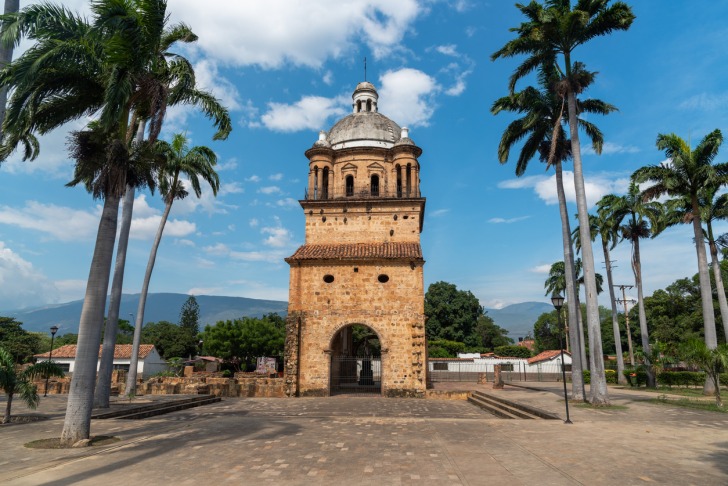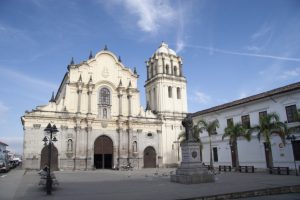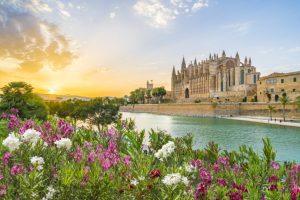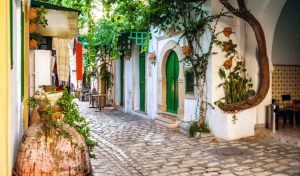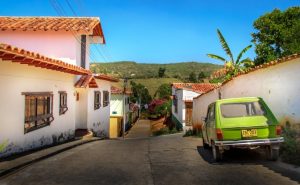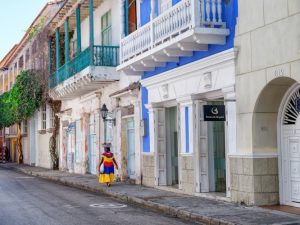 Colombia : Safety by City
Colombia : Safety by City
Colombia - safety as a country Cucuta is a vibrant city situated in the northeastern corner of Colombia near the Venezuelan border.
This South American tourist destination is brimming with cultural charm and historical landmarks that beckon tourists from around the globe.
If you’re thinking about traveling to Cucuta, you’re probably wondering how safe the area is for travel.
This guide provides an overview of warnings and dangers to consider when traveling in this Colombian city.
Warnings & Dangers in Cucuta

OVERALL RISK: HIGH
The interactive U.S. travel advisory map shows that Cucuta sits near the border of Venezuela, which has an even higher travel alert in effect than Colombia. Our state department currently has Do Not Travel protocols in place for areas of Venezuela and bordering Cucuta towns. Even though travel to Colombia is not strictly prohibited at this time, the US State Department strongly recommends that travelers take extreme precautions.

TRANSPORT & TAXIS RISK: HIGH
Official online reports and reports from recent travelers say that transport and taxi risks in Cucuta are incredibly high. Local officials report high numbers of assaults and kidnappings of people traveling or waiting for taxis. The risk is so high that U.S. government employees are prohibited from traveling by taxi or even by road between Colombian destinations.

PICKPOCKETS RISK: HIGH
The unusually high risk of being pickpocketed in Cucuta is in alignment with this city's many other risks and ranks high on the scale. Large factions of criminals and pockets of civil unrest make the likelihood of becoming a victim of pickpocketing, robbery, assault, and even kidnapping extraordinarily high in this Venezuelan border town. Travel safety experts recommend keeping your valuables hidden and staying on designated travel routes at all times.

NATURAL DISASTERS RISK: HIGH
Historical reports show that the potential for recurring natural disasters in Cucuta is high. Reports of flooding, landslides, rising sea levels, and the potential for the development of devastating cyclones show that residents and travelers in this area of the world are susceptible to a variety of natural disasters that make traveling to the region inadvisable at this time.

MUGGING RISK: HIGH
The city of Cucuta sits in a highly politically charged zone that neighbors another country under siege. Official local and global reports show that the risks of becoming the victim of mugging or robbery are very high in this area. Travelers who cannot avoid traveling to Cucuta at this time should take extreme precautions and remain vigilant to keep safe.

TERRORISM RISK: HIGH
A variety of international and local terrorist groups based in Colombia currently have many of its cities under siege. Reports from official sources show that terrorist groups may carry out assaults, robberies, kidnappings, and even car bombing attacks at public locations, including shopping centers, entertainment venues, hotels, and major sporting events.

SCAMS RISK: HIGH
Colombian locals and travelers are at an extremely high risk of becoming the victim of a scam. Several well-known scams are circulating in the area, including a "corrupt or fake police scam" where travelers have their personal belongings and travel documents confiscated by criminals or corrupt police officials posing as upstanding members of law enforcement. There are also high numbers of distracted pickpocketing, overcharging for goods and services, and fake good scams happening in this area.

WOMEN TRAVELERS RISK: HIGH
Solo women travelers to Colombia are at a devastatingly high risk of becoming crime victims. They are advised to take even more extreme precautions than usual if they are unable to avoid traveling alone in Colombia at all. High levels of violent crime, terrorist activities, and the potential for natural disasters make this a highly inhospitable environment for almost everyone – especially women and children. When possible, avoid traveling in this area at all costs until tensions between warring factions and corrupt officials ease.

TAP WATER RISK: HIGH
Official reports and recent travelers to Colombia say that while the drinking water in the area may not pose a substantial health risk, it is inadvisable to drink the water. Visitors and even residents are advised to avoid drinking tap water whenever possible and are recommended to substitute their drinking water with bottled water instead.
Safest Places to Visit in Cucuta
Previous visitors and locals said that there are safe areas in Cucuta around La Virgen de Torcoromo Shrine, which is a testament to the local culture, spirituality, and architecture of the city.
The Parque Nacional Natural Paramillo has also been marked as one of the safer areas in the city.
Places to Avoid in Cucuta
High-crime areas and places to avoid in Cucuta include La Playa, La Union, and Atalaya, as reports show even higher rates of violent crime and property crimes than the average in this area.
Safety Tips for Traveling to Cucuta
If you and your travel companions cannot avoid traveling to Colombia, use the following safety tips to stay safer when visiting this highly volatile country.
- Avoid Crowded Areas: Many of the violent crimes that happen in Cucuta break out unexpectedly in crowded areas. Avoid becoming the victim of a daylight robbery, pickpocketing, or worse, by steering clear of large crowds.
- Learn Spanish!: There is nothing worse than being surrounded by millions of other people and not understanding the language when an emergency arises. As such, Colombia-bound travelers should use free or paid apps to learn Spanish before traveling to highly volatile areas.
- Respect Local Customs and Traditions: Avoid accidentally offending local residents by learning the basic values, customs, and traditions of Colombians before visiting the area. Pay close attention to unspoken rules and local dress codes to avoid standing out as an easy target.
- Steer Clear of Abandoned Locations: The city of Cucuta is located in a highly volatile area. Its location near travel-banned countries contributes to high levels of murders, rapes, assaults, and kidnappings. Travelers need to remain on designated travel routes and avoid visiting locations that appear to be abandoned.
- Keep Your Valuables Hidden: Use common sense travel tips when visiting Cucuta. Keep valuables like cash, cell phones, and wallets hidden from sight. This area is known for high levels of scams, robberies, and pickpocketing.
- Keep a Low Profile: Blend in with the crowd and keep a low profile when traveling through the dangerous streets of Colombia. Adhering to local traditions and not standing out in a crowd is one of the best ways to avoid drawing the unwanted attention of nefarious criminals or warring drug gangs in the area.
- Enroll in U.S. Travel Programs for Safety: The U.S. State Department currently advises travelers to postpone or reconsider travel to Cucuta based on high levels of crime and terror in the region. Travelers who are unable to postpone their trips can register their travel with the STEP program to make it easier to find local solutions in an emergency.
- Have an Emergency Plan and Evacuation Route in Place: It is important for people traveling to violent and high-crime areas to be prepared with a pre-planned evacuation route and emergency plan. Create a plan that includes important contacts and safety routes in case emergency evacuation is needed.
- Stay Away from the Venezuelan Border: Official government reports show that high levels of volatility near the Venezuelan border are resulting in large numbers of people being kidnapped and detained for indefinite periods at the border. It is crucial for U.S. travelers to adhere to designated travel routes and itineraries to avoid being targeted by criminals patrolling the border.
- Erase Controversial Content from Your Public Networks and Channels: Consider erasing controversial or potentially offensive content from your social media channels when traveling. Many terrorist groups and criminals use social media to identify and target victims based on their social posts.
So... How Safe Is Cucuta Really?
Official reports from global crime statistics show that Cucuta is a moderately dangerous city.
The neighboring country of Venezuela is on the U.S. Department of State’s Do Not Travel Advisory.
There are a host of active terrorist cells and high numbers of violent crimes, including kidnapping and murders, that happen within the region and the entire country.
The Numbeo Global Crime Index assigns Cucuta a crime index score of 63.57.
Their index is designed to show levels of crime in an area based on a scale of 20-80+, where any score above 80 is considered extremely high.
How Does Cucuta Compare?
| City | Safety Index |
|---|---|
| Cucuta | 32 |
| Bogotá | 46 |
| Medellin | 52 |
| Cartagena | 82 |
| Barranquilla | 47 |
| Cali | 52 |
| Santa Marta | 33 |
| Buenos Aires (Argentina) | 60 |
| Vancouver (Canada) | 82 |
| Cordoba (Argentina) | 61 |
| Toronto (Canada) | 81 |
| Melbourne (Australia) | 80 |
| Montreal (Canada) | 81 |
Useful Information

Visas
Prospective travelers can visit the official Colombia government website to learn more about Visa application requirements, fees, and verification documents needed to apply.

Currency
The Colombian Peso (COP) is the official local currency. U.S. travelers needing to exchange USD for COP can visit local banks, currency exchange services, ATMs, and hotels or make online transfers to complete the exchange.

Weather
Residents and visitors of Cucuta enjoy a tropical climate filled with sunny days and daytime temperatures that sometimes rise into the hundreds. The humidity is high, and nighttime temperatures are cooler. Their dry seasons run from December to March. The rainy season can take up the remainder of the year.

Airports
The closest and busiest airport servicing Cucuta travelers and residents is the Camilo Daza International Airport. This airport features a modern design, service for domestic and international flights, and passenger amenities like duty-free shopping and onsite dining.

Travel Insurance
The nature of this highly volatile region makes having travel insurance a must for Cucuta-bound travelers. Travel insurance can help cover the unexpected costs of medical emergencies and trip cancelations due to ongoing issues of political unrest, terrorism, and natural disasters.
Cucuta Weather Averages (Temperatures)
Average High/Low Temperature
| Temperature / Month | Jan | Feb | Mar | Apr | May | Jun | Jul | Aug | Sep | Oct | Nov | Dec |
|---|---|---|---|---|---|---|---|---|---|---|---|---|
| High °C | 30 | 31 | 31 | 31 | 33 | 33 | 33 | 34 | 34 | 33 | 31 | 30 |
| Low °C | 22 | 22 | 23 | 23 | 24 | 24 | 24 | 24 | 24 | 23 | 23 | 22 |
| High °F | 86 | 88 | 88 | 88 | 91 | 91 | 91 | 93 | 93 | 91 | 88 | 86 |
| Low °F | 72 | 72 | 73 | 73 | 75 | 75 | 75 | 75 | 75 | 73 | 73 | 72 |
Colombia - Safety by City
| City | Safety Index |
|---|---|
| Barranquilla | 47 |
| Bogotá | 46 |
| Bucaramanga | 32 |
| Cali | 52 |
| Cartagena | 82 |
| Cucuta | 32 |
| Leticia | 70 |
| Manizales | 47 |
| Medellin | 52 |
| Popayan | 31 |
| Santa Marta | 33 |
